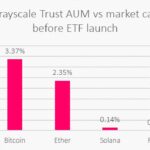In a striking turn of events this Easter Monday, Bitcoin (BTC) has managed to defy the overall downward trend of the stock market, rising by 2.3% in the last 24 hours to reach $86,800. This marks its highest value since early April, just after the Trump administration announced new tariff policies that spooked many investors. While Bitcoin’s performance has sparked some market interest, the broader cryptocurrency landscape remains relatively stable, with the CoinDesk 20 Index gaining a modest 1.17% as most digital assets held their ground.
Interestingly, crypto-related stocks such as Coinbase (COIN) and MicroStrategy (MSTR) saw slight dips of 1.2% and 1.3% respectively, while major Bitcoin mining companies like Marathon Digital Holdings (MARA), Riot Platforms (RIOT), and Core Scientific (CORZ) experienced even more significant losses, between 2% and 3%. This resilience in the crypto market comes amid a worrying backdrop where major stock market indices—the S&P 500, Nasdaq, and Dow Jones—each fell between 3.27% and 3.5%, retreating to lows not seen since the tariff discussions began.
Adding another layer to the narrative, gold has also seen a rise of 2.9% to trade at $3,400, highlighting an intriguing dynamic where both Bitcoin and gold may be perceived as safe havens amid economic uncertainty. Analysts at QCP Capital ponder whether the simultaneous uptick in these two assets reflects a significant shift in investor sentiment toward Bitcoin, suggesting it may be starting to be viewed as a legitimate alternative to gold in turbulent times.
“Bitcoin has NEVER held up this well with a VIX near 30,” commented Lawrence McDonald, a veteran in macro strategy, who recognized this moment as a potential turning point for Bitcoin’s maturity in the marketplace.
This flurry of activity is occurring as U.S. President Donald Trump has publicly criticized Federal Reserve Chair Jerome Powell, describing him as a “major loser” in a social media post. Trump is advocating for immediate interest rate cuts, asserting that many consumer costs have declined, despite ongoing fears about economic slowdown. As the situation evolves, it raises questions about the overall health of both traditional finance and emerging digital assets like Bitcoin.

Bitcoin’s Rising Resilience Amid Market Declines
The current dynamics in the financial markets signify important shifts that could impact investors and the broader economic landscape. Here are the key points regarding Bitcoin’s recent performance and related economic factors:
- Bitcoin’s Surge: Bitcoin (BTC) has increased by 2.3% in the last 24 hours, reaching $86,800 for the first time since early April.
- Market Contrast: While Bitcoin shows resilience, traditional stock markets (S&P 500, Nasdaq, Dow Jones) have fallen by around 3%.
- Correlation with Gold: Bitcoin’s movement aligns with a 2.9% increase in gold prices, raising questions about Bitcoin’s potential as a safe-haven asset.
- Impact of Tariffs: The stock market’s decline is linked to tariff-related concerns announced by the Trump administration, influencing investor sentiment.
- Stability of Crypto-Linked Stocks: Stocks related to cryptocurrency, such as Coinbase and major mining firms, have shown stability despite adverse market conditions.
- Investor Sentiment: The resilience of Bitcoin amid stock declines reflects investor anxiety about the economy and could lead to shifts in investment strategies.
- Calls for Policy Change: Trump’s criticism of the Federal Reserve and calls for lower interest rates may further inject volatility into the market, affecting all asset classes.
“Was today’s tandem rally in bitcoin and gold merely holiday-driven noise, or a meaningful shift towards bitcoin as a safe-haven asset?” – Analysts at QCP Capital
Understanding these factors is crucial for readers as it may influence individual investment decisions and perceptions of asset stability in an uncertain economic environment.
Bitcoin Defies Market Trends: Analyzing Cryptocurrency’s Resilience
In a striking display of fortitude, Bitcoin has managed to thrive amidst a declining stock market, painting a vivid picture of the cryptocurrency’s potential as a safe-haven asset. Unlike traditional indicators such as the S&P 500 or the Dow Jones, which have faltered under tariff-related pressures, Bitcoin has seen a modest surge, trading at $86,800—a noteworthy rebound after weeks of turmoil. This is particularly significant when you consider that the CoinDesk 20 Index has also enjoyed a slight uptick alongside Bitcoin’s impressive performance.
When juxtaposed with the broader market, Bitcoin’s resilience presents numerous implications. The fact that the cryptocurrency is rising while the major stock indices are struggling underscores a potential shift in investor sentiment. Many might now consider Bitcoin as a refuge during economic uncertainty, particularly given the declining strength of the U.S. dollar, represented by the DXY index hitting a three-year low. Analysts at crypto trading firm QCP Capital emphasize this possibility, suggesting that Bitcoin is increasingly being viewed as a safe-haven asset, akin to gold.
However, this newfound position comes with both advantages and disadvantages. For investors feeling the pinch from traditional markets, Bitcoin could serve as a compelling alternative, drawing in those looking to diversify away from stocks and cash. Additionally, the views of seasoned analysts, such as Lawrence McDonald, highlight the potential for Bitcoin to attract gold investors, as they reassess the reliability of their existing assets in light of current economic pressures.
On the flip side, Bitcoin’s current high amid a turbulent economic landscape might also deter risk-averse investors who remain skeptical about its volatility. It’s essential to recognize that Bitcoin’s correlation with assets like gold and equities will need careful monitoring. Should traditional markets rebound, cryptocurrencies could face significant pressure to follow suit, or risk being seen as less reliable by cautious investors. Furthermore, the ongoing political tension surrounding Federal Reserve Chair Jerome Powell adds an extra layer of uncertainty that could influence investor behavior in unpredictable ways.
This scenario particularly benefits savvy traders and institutional investors who are quick to capitalize on market shifts, while it could present obstacles for retail investors still grappling with the psychological weight of the market’s volatility. As investor sentiment continues to evolve, both Bitcoin’s place in the financial ecosystem and the responses from traditional markets remain critical areas to watch as we navigate this complex economic landscape.
















